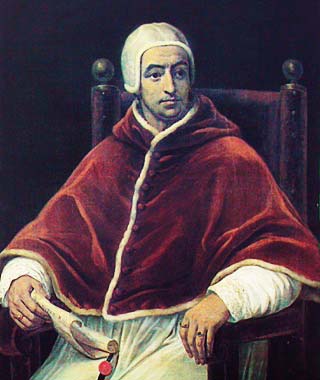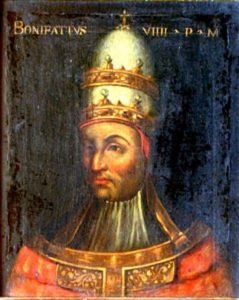Pope Boniface VIII, 1294-1303
Pope Benedict XIII, 1394-1417
The German Empire (Second Reich)
Pope Benedict XIII, 1394-1417
For many centuries at this time, the worst popes in the history of the office, committing the most heinous crimes against God and man, sat on the papal throne, and used their position not only to trample the flock, but to grasp ever more power, wealth, and licentious living to themselves. (Ten Horns, pg. 261).
“In the year of our Lord 1408, when pope Benedict XIII did oppose the French church by tributes and exactions; the clergy, assembled by the command of King Charles VI decreed, That the king and inhabitants of the kingdom ought not to obey Benedict, who was an heretic, a schismatic, and altogether unworthy of that dignity: the which the estates of the kingdom approved, and the parliament of Paris confirmed by a decree. The same clergy also ordained that those who had been excommunicated by that pope, as forsakers and enemies of the church, should be presently absolved, nullifying all such excommunications, and this has been practised not in France only, but in other places also, as histories do credibly report. The which gives us just occasion most perspicuously to see and know, that if he who holds the place of a prince do govern ill, there may be a separation from him without incurring justly the blame of revolt; for that they are things in themselves directly contrary, to leave a bad pope, and forsake the church, a wicked king, and the kingdom.”
Junius Brutus, A Defence of Liberty Against Tyrants, part II (written in 1579).

Pope Boniface VIII, 1294-1303
For many centuries at this time, the worst popes in the history of the office, committing the most heinous crimes against God and man, sat on the papal throne, and used their position not only to trample the flock, but to grasp ever more power, wealth, and licentious living to themselves. (Ten Horns, pg. 261).
“About the year 1300 Pope Boniface VIII, seeking to appropriate to his See the royalties that belonged to the crown of France, Philip the Fair, the then king, did taunt him somewhat sharply: the tenor of whose tart letters are these:
“Philip by the Grace of God, King of the French, to Boniface, calling himself Sovereign Bishop, little or no health at all.
“Be it known to the great foolishness and unbounded rashness, that in temporal matters we have only God for our superior, and that the vacancy of certain churches belongs to us by royal prerogative, and that appertains to us only to gather the fruits, and we will defend the possession thereof against all opposers with the edge of our swords, accounting them fools, and without brains who hold a contrary opinion.”
“In those times all men acknowledged the pope for God’s vicar on earth, and head of the universal church. Insomuch, that (as it is said) common error went instead of a law, notwithstanding the Sorbonists being assembled, and demanded, made answer, that the king and the kingdom might safely, without blame or danger of schism, exempt themselves from his obedience, and flatly refuse that which the pope demanded; for so much as it is not the separation but the cause which makes the schism, and if there were schism, it should be only in separating from Boniface, and not from the church, nor from the pope, and that there was no danger nor offence in so remaining until some honest man were chosen pope.
“Everyone knows into what perplexities the consciences of a whole kingdom would fall, which held themselves separated from the church, if this distinction be not true.”
Junius Brutus, A Defence of Liberty Against Tyrants, part II (written in 1579).

The German Empire (Second Reich)
In the wake of the collapse of the Holy Roman Empire, which was known in Germany as the First Reich, the German nobles created out of the Confederation of German States, the German Empire, or Second Reich, with Wilhelm, king of Prussia, as Emperor, in 1871. (Ten Horns, pg. 263).
“William [of Prussia], in 1861, succeeded to the crown. The autocratic spirit of King William was shown at his coronation. ‘The kings of Prussia,’ he said, ‘receive their crowns from God.’ … The King dissolved the House of Representatives [of the German Confederation], and called to his aid Otto von Bismark-Schönhausen, a gentleman of Brandenburg, known for his distrust of parliamentary institutions and his devotion to the principle of absolute rule. The policy of Bismark became the policy of the crown. Together King WIlliam and his minister created the Germany of to-day [written in 1903]. … ‘It is not Prussia’s liberality that Germany looks to, but her military power,’ said Bismark; and again: ‘The unity of Germany is to be brought about not by speeches, nor by the voice of majorities, but by blood and iron.’ …
“The union of Germany under Prussian leadership was accomplished by means of three wars: one with Denmark in 1864; the second with Austria in 1866; and the third with France in 1870. … [At the conclusion of the French war] In the Hall of Mirrors of the palace of Versailles, surrounded by a victorious army, the King of Prussia was crowned Emperor in the presence of the German sovereigns (January 18, 1871) receiving the crown ‘from himself and his equals.’ The Empire included all the German lands, save those of Austria.”
Merrick Whitcomb, A History of Modern Europe, pp. 214-218.
